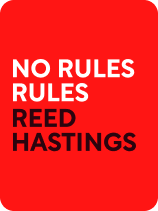
This article is an excerpt from the Shortform book guide to "No Rules Rules" by Reed Hastings. Shortform has the world's best summaries and analyses of books you should be reading.
Like this article? Sign up for a free trial here .
Are you thinking of reading No Rules Rules? How well was the book received by critics?
In No Rules Rules, Netflix CEO Reed Hastings and business professor and author Erin Meyer detail how the company achieved this level of success by implementing unconventional management practices that empower employees and promote innovation.
Here is our No Rules Rules review.
Book Overview
We will start our No Rules Rules review with a brief overview of the book. Starting as a DVD-by-mail service, Netflix evolved into a streaming service that now offers video on demand to over 200 million subscribers worldwide (as of October 2021). No Rules Rules details the unique culture that propelled Netflix to success in a rapidly changing industry where creative innovation and agility are key.
The main principles behind the Netflix culture are cultivating a highly talented staff, creating an atmosphere of radical candor, and removing controls and approvals. The book discusses the unconventional practices that are rooted in this culture, such as firing adequate employees, sharing sensitive financial data with all employees, and eliminating vacation policies.
About the Authors
Reed Hastings is the co-founder, chairman, and co-CEO of Netflix. His father was a lawyer who worked for the Nixon administration, and his mother was a debutante from a Social Register family. Hastings’s mother had an aversion to high society and raised her children to be similarly disinclined.
After graduating from Bowdoin College, Hastings joined the Peace Corps as a volunteer teacher in Swaziland then earned an MS in Computer Science from Stanford University. In 1991, he launched his first company, Pure Software, which later merged with another company to form Pure Atria. At Pure Atria, Hastings met Marc Randolph, who would later become Netflix’s co-founder.
The Netflix origin story varies depending on who’s telling it: Hastings says he got the idea after he was charged a $40 late fee on a VHS rental; however, Randolph says that he and Hastings had brainstorming sessions as they carpooled to the Pure Atria office. In any case, after Pure Atria was acquired, Hastings and Randolph co-founded Netflix in 1997, with Randolph as CEO.
Randolph ceded the CEO role to Hastings in 1999 before leaving Netflix in 2003. The two remain on good terms—in an interview, Randolph says he considers Hastings to be the best entrepreneur in the world, the rare breed who’s excellent at both starting and scaling companies. Randolph adds that, if the opportunity presented itself, he would go into business with Hastings again “in a heartbeat.”
Hastings owns about 1% of Netflix and has a net worth of $6.1 billion (as of November 2021). By many accounts, he isn’t the usual rock-star billionaire CEO. He’s been described as low-key, modest, and self-effacing—likely a result of his upbringing. Some credit his personality to his age and experience: While other big tech CEOs were in their 20s or 30s when they founded their companies, Hastings was already in his 40s by the time Netflix went public in 2002.
Outside of Netflix, Hastings is an advocate of education reform. He served on the California State Board of Education and is a strong supporter of charter schools. He and his wife Patty have also made a number of donations to educational institutions, including a $120 million endowment to two historically Black colleges and the United Negro Fund.
Connect With Reed Hastings:
Erin Meyer is an author and professor at INSEAD, a leading international business school located in Paris, France. Having lived and worked in Africa, Europe, and the U.S., Meyer has a deep understanding of different management and communication styles across cultures. She used her insights as well as data collected from over 30 countries as the basis for her first book, The Culture Map, published in 2014.
In 2017 and 2019, Meyer was selected by Thinkers50 as one of the most impactful business writers in the world. According to Meyer’s website, she was also named one of the top 30 most influential HR thinkers in 2018. Her work has been published in the Harvard Business Review, The New York Times, and Forbes. No Rules Rules is her second book.
Connect with Erin Meyer:
The Book’s Publication
No Rules Rules, published by Penguin Press in 2020, grew from the Netflix Culture Deck—127 slides outlining the key principles of Netflix’s culture of “freedom and responsibility.” Hastings made the deck available online in 2009, and it became a Silicon Valley sensation. It got millions of views (over 15 million by the time it was updated in 2017) and garnered praise from the likes of Facebook COO Sheryl Sandberg.
However, not everyone was a fan—Meyer included. In the introduction to No Rules Rules, she reveals that she thought the culture deck described a hostile working environment that went against sound management principles such as providing psychological safety for employees and maintaining smooth workplace relationships. Still, Meyer was intrigued by the company’s undeniable success in a rapidly shifting industry. She also found it interesting that, despite seeming like a highly stressful workplace, Netflix placed second in a ranking of companies with the happiest employees.
In 2015, Hastings was on the lookout for an impartial expert to help him write a book explaining how and why Netflix’s unusual approach led to success. He wanted to demonstrate to younger generations that there are other ways of operating a business apart from the usual industrial, top-down model. Impressed with Meyer’s work in The Culture Map, Hastings reached out to her and eventually invited her to interview Netflix employees. Meyer welcomed the chance to better understand a company culture that she described as “weird.” A big part of No Rules Rules comes from over 200 interviews that Meyer conducted with current and former Netflix employees at every level, in different offices around the world.
Historical Context
No Rules Rules was released at a time when Big Tech companies were under increasing scrutiny. While the other FAANG (Facebook, Amazon, Apple, Netflix, and Google) companies grappled with issues such as self-serving ideologies, mistreatment of women and people of color, and questionable privacy safeguards, Netflix remained largely unscathed. (Netflix did have their own issues, but these wouldn’t surface until October 2021.) A writer from the New York Times questioned whether the timing of the book’s release threatened to draw Netflix into the swirl of Big Tech controversy but ultimately concluded that No Rules Rules was a timely reminder that freedom and responsibility should go hand in hand.
Intellectual Context
No Rules Rules falls under the genre of books about the culture and practices at highly successful companies. Other books in this category include:
Principles: Life and Work—Ray Dalio, founder, co-chairman, and co-chief investment officer of Bridgewater Associates, writes about the firm’s culture of openness and transparency, which echoes Netflix’s culture of radical candor. Dalio believes that these principles have enabled Bridgewater to become the largest hedge fund in the world.
Creativity, Inc.—Similar to Netflix, Pixar Animation Studios relies heavily on creativity and innovation. In this book, Pixar co-founder Ed Catmull writes about how promoting candor and embracing change can nurture and sustain a creative environment.
Built to Last—Jim Collins and Jerry I. Porras find common themes among enduringly successful companies. Like Netflix, these companies have a distinctive culture (described as “cult-like”), which empowers people to experiment and get creative.
The Culture Code—while Netflix is built on a culture of high performance and radical candor, Daniel Coyle argues that organizations become successful by developing a culture based on the concepts of safety, vulnerability, and purpose.
Critical Reception
No Rules Rules made the New York Times bestseller list and was nominated for the 2020 Financial Times and McKinsey Business Book of the Year.
Positive reviews say that No Rules Rules is insightful and entertaining, with clearly written concepts supported by detailed examples and anecdotes. Critical reviews say that the book is repetitive and doesn’t present an objective view of the company—it highlights the positives of the culture without going into detail about the negative aspects.
Commentary on the Book’s Approach
The book is divided into four sections:
- Principles: the fundamental principles behind Netflix’s culture of freedom and responsibility. These include hiring and keeping top-tier talent, promoting an atmosphere of candor and openness, and eliminating vacation policies and expense approvals.
- Practices: the specific ways that Netflix implements the principles. The chapters in this section detail compensation, transparency, and employee autonomy.
- Progression: how Netflix maintains and reinforces the company culture. These chapters cover employee evaluations and a management style called leading with context.
- Expansion: how Netflix applies its distinctive company culture to offices around the world while accommodating cultural differences.
Throughout the book, the narrative switches between Hastings and Meyers. Hastings provides his first-person account of the events, as well as his reasoning for cultivating this kind of culture, while Meyer adds context with data about other companies’ business practices and excerpts from interviews with hundreds of current and former Netflix employees.

———End of Preview———
Like what you just read? Read the rest of the world's best book summary and analysis of Reed Hastings's "No Rules Rules" at Shortform .
Here's what you'll find in our full No Rules Rules summary :
- How Netflix achieved massive success in a short period of time
- The unusual business practices that have helped Netflix sustain its success
- Why Netflix fires adequate employees






